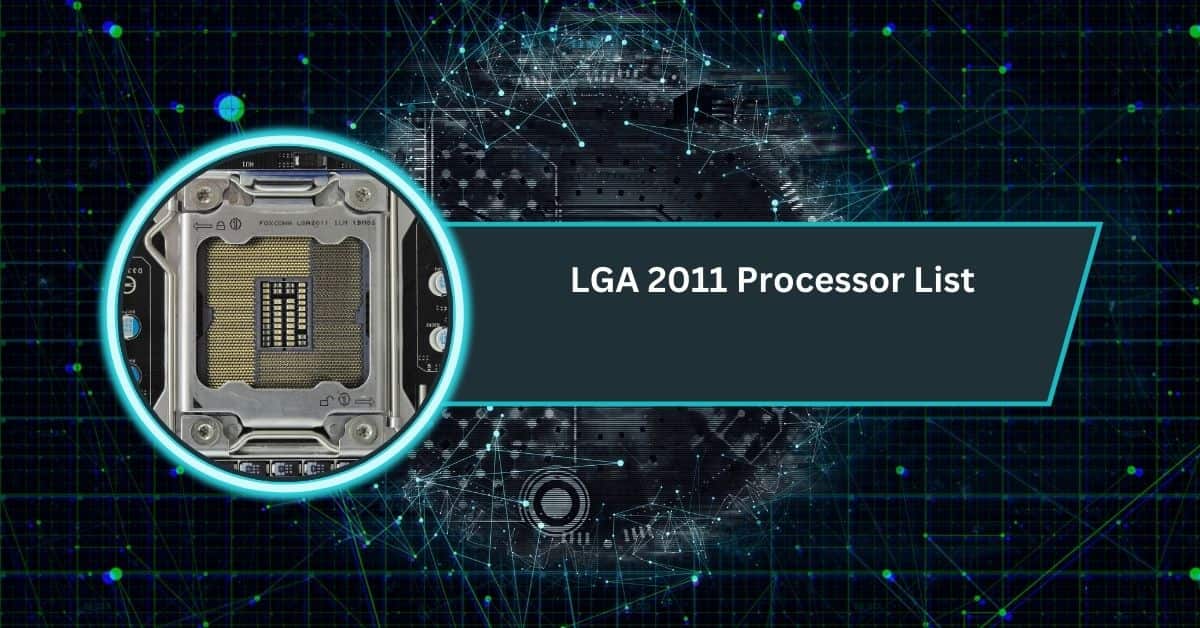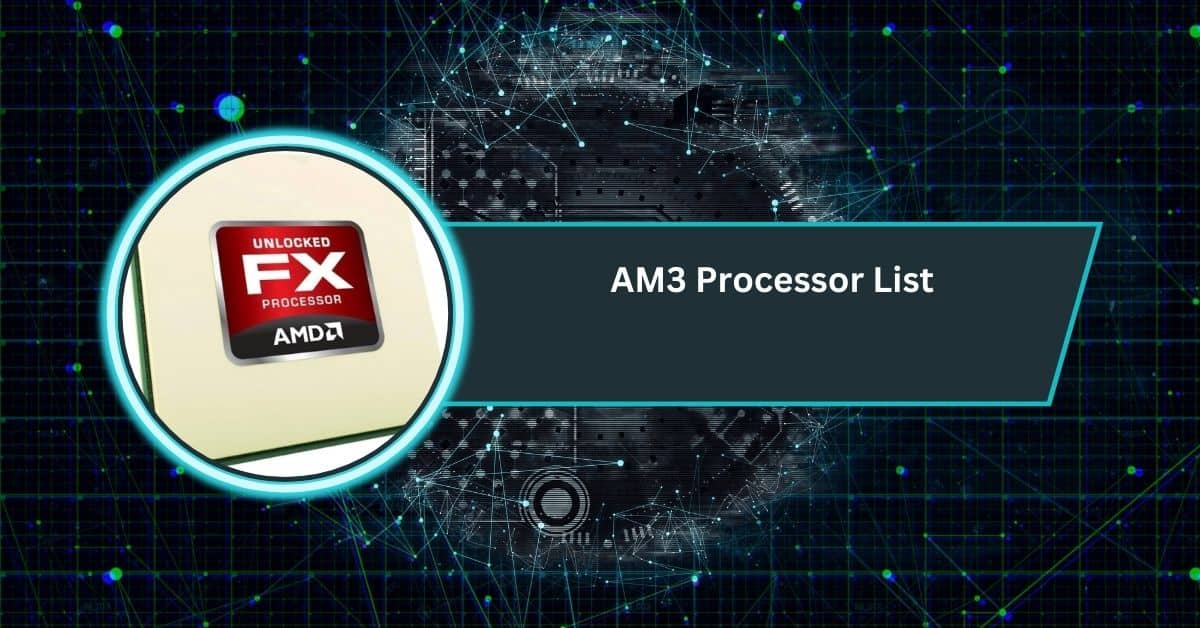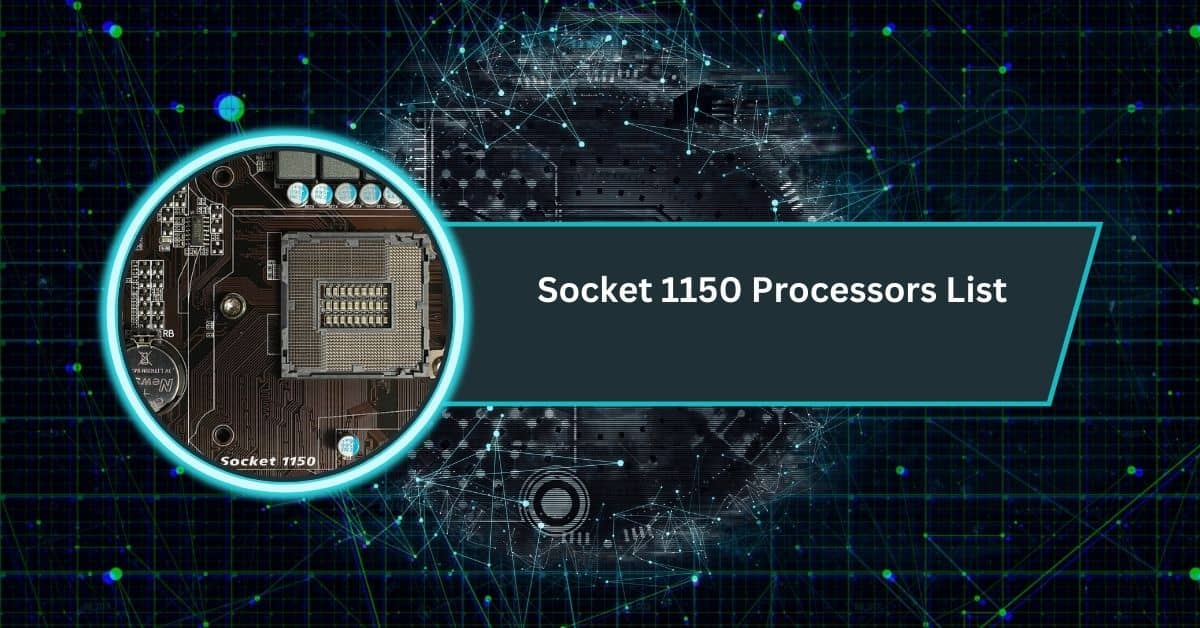The LGA 1150 socket, also known as Socket H3, was introduced by Intel as part of their 4th and 5th-generation processors.
The LGA 1150 processor list includes various Intel CPUs, such as Core i3, i5, i7, and Pentium. These processors are compatible with the LGA 1150 socket, offering options for gaming, productivity, and everyday tasks.
In this article, we will discuss the “LGA 1150 Processor List”
What is the LGA 1150 Socket?
The LGA 1150 socket, also called Socket H3, is a CPU socket used by Intel for its 4th and 5th-generation processors (Haswell and Broadwell).
It connects the processor to the motherboard, allowing them to work together. Released in 2013, it became popular for its great performance, energy efficiency, and support for various desktop computing tasks.
1. The Role of the LGA 1150 in Computing History

The LGA 1150 was key in desktop computing from 2013 to 2015. It powered a range of systems, from budget-friendly PCs to high-performance setups.
Known for reliability and efficiency, it bridged the gap between older and modern processors, offering better-integrated graphics and multitasking for gamers and professionals alike.
2. Why Understanding Processor Compatibility is Important
Choosing a processor that matches your motherboard ensures your PC works smoothly. A compatible CPU avoids issues like system errors or wasted money.
The LGA 1150 socket, for example, only works with specific Intel processors and chipsets. Knowing this helps users build a stable, efficient computer that meets their needs without unnecessary upgrades.
Overview of Intel Chipsets Compatible with LGA 1150
1. Intel 8-Series Chipsets
Intel 8-Series chipsets, such as the Z87 and H87, offer solid performance for everyday tasks and gaming. They support LGA 1150 processors, provide USB 3.0, and have improved power efficiency.
2. Intel 9-Series Chipsets
Intel 9-Series chipsets, like the Z97 and H97, offer more advanced features, including better overclocking support, faster data transfer, and enhanced stability. They’re a great choice for users looking for higher performance.
Also Read: Whats The Best Processor For My B450 Aorus M: Exploring!
Categories of LGA 1150 Processors
1. Entry-Level Processors
Entry-level LGA 1150 processors, like Intel Pentium and i3, are affordable and great for basic tasks like browsing the web, watching videos, or using office applications, offering decent performance for light use.
2. Mid-Range Processors
Mid-range LGA 1150 processors, like the Intel i5 series, offer a balance of performance and price.
They handle multitasking, gaming, and productivity tasks well, making them ideal for everyday users and gamers on a budget.
3. High-End Processors
High-end LGA 1150 processors, such as the Intel i7 series, offer excellent performance for demanding gaming, video editing, and 3D rendering tasks. They have higher clock speeds, more cores, and greater multitasking power.
Popular LGA 1150 Processors
1. Intel Core i7 Series
Intel Core i7 processors, like the i7-4790K, offer great performance for demanding gaming and video editing tasks. They have more cores and higher speeds, making them perfect for power users and professionals.
2. Intel Core i5 Series
The Intel Core i5 series, such as the i5-4690K, is a solid choice for gamers and general users. They provide a good balance of performance and price, efficiently handling multitasking, gaming, and productivity.
3. Intel Core i3 Series
Intel Core i3 processors, like the i3-4160, are budget-friendly for everyday tasks like web browsing and word processing. They offer good performance for casual users without needing a high-end processor.
4. Intel Pentium and Celeron Processors
Pentium and Celeron processors are affordable options for basic tasks. They are perfect for budget users needing to browse the web, check emails, or use office applications, offering solid performance for light computing.
Technical Specifications of LGA 1150 Processors

1. Clock Speeds and Core Counts
LGA 1150 processors offer clock speeds ranging from 2.0 GHz to 4.0 GHz, with dual-core and quad-core options. Faster speeds and more cores help with multitasking, gaming, and demanding applications.
2. Thermal Design Power (TDP)
Depending on the model, LGA 1150 processors have TDPs ranging from 35W to 88W. Lower TDP means better energy efficiency, while higher TDP models handle intense workloads and perform heavy tasks like gaming or editing better.
3. Integrated Graphics Capabilities
LGA 1150 processors feature Intel HD Graphics, which provide decent visual performance for everyday tasks like web browsing, light gaming, and video playback. While not suitable for high-end gaming, they’re sufficient for casual use.
Must Read: How To Enable Processor Lombok In Intellij: Complete Guide
Best Use Cases for LGA 1150 Processors
1. Gaming
LGA 1150 processors like Intel i5 and i7 perform well in gaming when paired with a good GPU. They handle most modern games at decent settings, offering smooth gameplay without needing the latest hardware.
2. Office Work and Productivity
LGA 1150 processors like Intel Core i3, i5, and Pentium provide reliable performance for office work.
They handle tasks like web browsing, word processing, and multitasking well, making them ideal for home or office computers.
3. Media Editing and Content Creation
High-end LGA 1150 processors like Intel Core i7 efficiently handle media editing and content creation.
They provide enough power for video editing, graphic design, and rendering, making them a good choice for creative professionals.
How to Choose the Right LGA 1150 Processor
1. Evaluating Your Budget
Your budget will guide the processor’s choice. Entry-level options like Pentium and i3 are affordable, while higher-end processors like i7 offer top performance for gaming or heavy tasks but come at a higher price.
2. Performance vs. Power Efficiency
Choose between performance and power efficiency depending on your needs. High-performance processors like the i7 use more power but handle heavy tasks better, while more energy-efficient options like the i3 are perfect for light tasks with lower energy consumption.
3. Compatibility with Other Components
Ensure the processor matches your motherboard’s chipset and supports compatible RAM and GPU. For LGA 1150 processors, check that your motherboard has the right socket and chipset to ensure a smooth system build.
Comparing LGA 1150 Processors to Other Sockets

1. LGA 1150 vs. LGA 1151
LGA 1151 supports newer Intel processors with better performance, faster memory, and more features than LGA 1150. It’s more future-proof, making it a better choice for new builds or upgrades than LGA 1150.
2. LGA 1150 vs. LGA 1200
LGA 1200 offers improved performance over LGA 1150, supporting 10th and 11th gen Intel processors. It provides faster speeds, better efficiency, and modern features, making it a better choice for demanding tasks and future-proof builds.
Where LGA 1150 Stands in Today’s Market
LGA 1150 is outdated compared to newer sockets like LGA 1151 and LGA 1200. However, it still offers decent performance for budget-friendly builds and older systems, making it suitable for light gaming, productivity, and basic tasks.
Upgrading from an LGA 1150 Processor
1. Signs It’s Time for an Upgrade
If your LGA 1150 processor struggles with newer games or software, it’s time to upgrade. Slow performance, frequent crashes, or the inability to run modern applications are signs that your processor is outdated and needs replacing.
2. What to Look for in a New Processor
When upgrading, look for a processor with higher clock speeds, more cores, and improved power efficiency.
Choose a model that supports your tasks for gaming, media editing, or productivity. Compatibility with your motherboard is also essential.
3. Transitioning to a New Socket Type
Switching to a new socket type means you’ll need a new motherboard. When upgrading to newer processors, ensure the new socket (like LGA 1151 or LGA 1200) fits your system’s needs, and check compatibility with your RAM and other components.
Buying & Upgrade Tips (Used Market Guidance)
- Check motherboard compatibility before buying a Broadwell SKU — read the vendor’s CPU support list.
- Prefer boxed or known-good sellers — verify model numbers and that the CPU hasn’t been heavily overclocked or damaged.
- For upgrades, sometimes a BIOS-only update may be necessary — keep an older CPU or choose a vendor with Dual BIOS features to recover from bad flashes.
- If building a lightweight retro or budget machine, pair an i5-4690/4790 with a modern midrange GPU and 8–16 GB DDR3 for a balanced system.
- For workstation use where ECC matters, seek out compatible Xeon E3 parts and ECC-capable motherboards.
LGA 1150 Processor Generation
The LGA 1150 socket supports Intel’s 4th and 5th-generation processors, also known as Haswell and Broadwell.
These processors introduced improved energy efficiency and performance over previous generations, making them popular for everyday tasks, gaming, and basic computing.
LGA 1150 Best CPU
The Intel Core i7-4790K is considered one of the best processors for the LGA 1150 socket. It offers great performance for gaming, multitasking, and demanding tasks. Its high clock speeds and overclocking capabilities make it a top choice for many users.
Read More: 32 Bit Enterprise Can Access Up To 4ghz Processor: Guide
LGA 1150 Supported Processors
LGA 1150 supports a range of processors, including Intel Core i3, i5, i7, Pentium, and Celeron. These processors have different performance levels, from budget-friendly options like Pentium and Celeron to high-performance models like the Core i7 for gaming and content creation.
LGA 1150 Motherboard
LGA 1150 motherboards are compatible with Intel’s 4th and 5th-generation processors. They come in different chipsets, such as the 8-Series and 9-Series, offering features like support for DDR3 RAM, multiple PCIe slots, and integrated graphics. Be sure to match the chipset for your needs.
LGA 1150 Processor i7

Intel Core i7 processors for LGA 1150, like the i7-4790K, provide excellent performance for heavy gaming, video editing, and multitasking tasks.
They feature more cores, higher clock speeds, and hyper-threading, making them ideal for users needing powerful computing capabilities.
LGA 1150 Processor List for Gaming
For gaming on LGA 1150, the Intel Core i7-4790K, i5-4690K, and i5-4460 are some of the best processors.
They offer great performance with high clock speeds and enough cores to run modern games smoothly when paired with a capable GPU.
LGA 1150 CPU List for Gaming
Top LGA 1150 CPUs for gaming include the Intel Core i7-4790K, i5-4690K, and i5-4460. These processors are powerful enough to handle most modern games, offering a good balance of performance and efficiency for a smooth gaming experience combined with a strong GPU.
LGA 1151 CPU List
- Supports Intel 6th, 7th, 8th, and 9th Gen CPUs
- Includes Core i3, i5, i7, and i9 models
- Also works with Pentium and Celeron chips
- Some Xeon processors supported
- Uses DDR4 memory
FAQs
1. What processors does LGA 1150 support?
LGA 1150 supports Intel Core i3, i5, i7, Pentium, and Celeron processors from the 4th and 5th generations.
2. Is LGA 1150 obsolete?
LGA 1150 is outdated compared to newer sockets, but it’s still functional for budget builds and light computing tasks.
3. What is the best processor for LGA 1150?
The Intel Core i7-4790K is considered one of the best LGA 1150 processors, offering great performance for gaming and multitasking.
4. Does the LGA 1150 support 5th gen?
Yes, LGA 1150 supports 5th generation Intel processors, like the Broadwell family’s Intel Core i5 and i7.
5. Which chipset will suit this LGA 1150 socket?
Intel 8-Series and 9-Series chipsets, like Z87 and Z97, are compatible with the LGA 1150 socket, offering good performance.
6. Is LGA 1150 good for gaming?
Yes, LGA 1150 is still good for light gaming. With i5 or i7, it runs older games smoothly.
7. What is the successor of LGA 1150?
The successor of LGA 1150 is LGA 1151, which supports newer Intel CPUs and DDR4 memory for better performance.
8. What RAM is supported by LGA 1150?
LGA 1150 motherboards use DDR3 memory. Most boards support up to 32GB or 64GB, depending on chipset and slots.
9. What is the fastest CPU ever built?
The fastest CPU ever built is debated, but Intel Core i9 and AMD Ryzen Threadripper lead modern high-performance computing.
10. What is the best GPU for LGA 1150?
The best GPU for LGA 1150 depends on CPU choice, but GTX 1660 or RTX 2060 offer balanced performance.
Conclusion
In conclusion, the LGA 1150 socket offers a variety of processors suitable for different tasks, from budget computing to high-end gaming. While outdated, it remains a solid choice for those on a budget or upgrading older systems.











